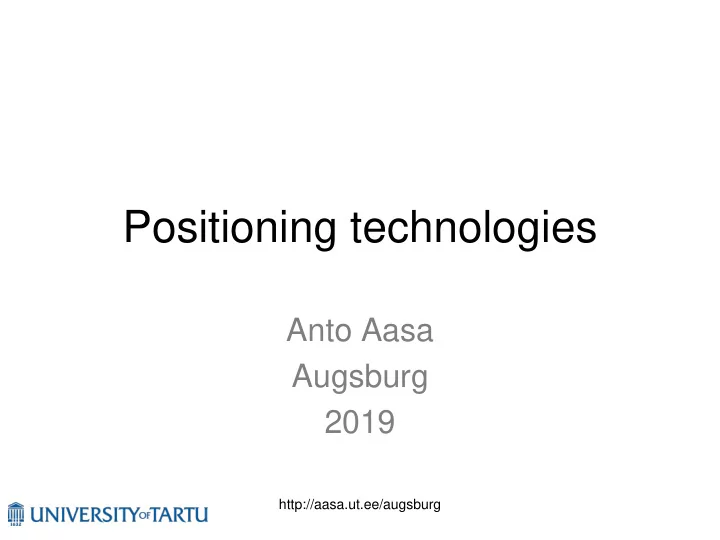

Positioning technologies Anto Aasa Augsburg 2019 http://aasa.ut.ee/augsburg
Location aware search http://aasa.ut.ee/augsburg
http://aasa.ut.ee/augsburg
• How to determine a location? – „ Where are you ?“ – GPS (Global Positioning System) • Galileo, GLONASS – Mobile positioning – WiFi, Bluetooth – RFID (Radio-frequency identification) – NFC (Near Field Communication) http://aasa.ut.ee/augsburg
GNSS • (Global Navigation Satellite System) is a satellite system that is used to pinpoint the geographic location of a user's receiver anywhere in the world. http://aasa.ut.ee/augsburg
Systems: • GPS (global positioning system): USA • GLONASS ( Глобальная навигационная спутниковая система ): Russia • BeiDou: China • Galileo: EU • IRNSS (Indian Regional Navigation Satellite System). India • QZSS (Quasi-Zenith Satellite System): Japan http://aasa.ut.ee/augsburg
Global • GPS • GLONASS • Galileo • Compass (BeiDou 2) http://aasa.ut.ee/augsburg
Galileo satelliite constellation http://aasa.ut.ee/augsburg
GLONASS vs GPS GPS GLONASS http://aasa.ut.ee/augsburg http://science.nasa.gov/realtime/jtrack/3d/JTrack3D.html/
2012 – regional BeiDou, China 2020 – global http://aasa.ut.ee/augsburg http://www.nature.com/articles/srep04692/figures/1
Indian Regional Navigation Satellite System NAVIC http://aasa.ut.ee/augsburg
QZSS, Japan Quasi-Zenith Satellite System 3 + 1 satellites
GPS • Global Positioning System http://aasa.ut.ee/augsburg
• GPS: http://aasa.ut.ee/augsburg
Dilution of precision (DoP) http://aasa.ut.ee/augsburg
• GPS-chip: http://aasa.ut.ee/augsburg
Wireless communication • Signals – Radio – Light • Communication between fixed and mobile terminals http://aasa.ut.ee/augsburg
Different „ things “ in different frequencies http://aasa.ut.ee/augsburg
• Antennas • Speed of electomagnetic waves • Refraction of electromagnetic waves http://aasa.ut.ee/augsburg
Multipath propagation • Signal reaches the receiving antenna on various paths – reflection – shadowing – diffraction – scattering http://aasa.ut.ee/augsburg
Architecture and operation of mobile network is very complex http://aasa.ut.ee/augsburg
Principles of positioning • Selection of positioning method • Selection of essential measuring parameters (angle, distance, range, speed) – usually relationships between two objects one of which is fixed in space • Reference system (descriptive vs spatial) • Infrastructure • Protocol & script – management of positioning process http://aasa.ut.ee/augsburg
Quality of positioning • Accuracy and precision • Yield and consistency • Overhead • Power consumption • Latency • Roll-out and operating costs http://aasa.ut.ee/augsburg
Accuracy and precision http://aasa.ut.ee/augsburg
Positioning infrastructures http://aasa.ut.ee/augsburg
• Dead reckogning – (Ariadne ’ thread) – Position and direction of motion and velocity and Gyroscope distance Accelerometer Odometer – Tunnels? http://aasa.ut.ee/augsburg
Satellite navigation • First satellite (sputnik): 1957. Soviet Union • USA Explorer I 1958. • First satellite navigation system Transit – 7 satellites; 1964; US Navy – 1 position fix = 15 minutes • GPS started 1978. – 24 satellites – GPS III generation http://aasa.ut.ee/augsburg
Satellite navigation • Advantages: – accuracy – global availability; Integration with mobile phone A-GPS • Disadvantages: – energy consumption, – slow start, – not for indoor use, – need for open sky – enourmous capital invstements. http://aasa.ut.ee/augsburg
A-GPS • Assisted GPS • Advantages: – higher accuracy, – faster position fix, – lower energy consumption, http://aasa.ut.ee/augsburg
A-GPS http://aasa.ut.ee/augsburg
A-GPS in mobile phone http://aasa.ut.ee/augsburg
Mobile positioning Terminal based Operator based http://aasa.ut.ee/augsburg
Mobile positioning methods • CGI – cell identification • 3G SAI - Service Area Identity • E-CGI – enhanced cell identification • TOA – time of arrival • E-OTD - enhanced observed time deifference • TDOA - time difference of arrival • AOA – angle of arrival • A-GPS – assisted GPS • Hybrid http://aasa.ut.ee/augsburg
GSM positioning • CGI ( Cell Global Identity ) • CGI+TA ( Cell Global Identity + Timing Advance ) • ... • ... http://aasa.ut.ee/augsburg
CGI Cell Global Identity • Accuracy ranges from below 100 m up to 35 km • Fast http://aasa.ut.ee/augsburg
CGI-TA Cell Global Identity + Timing Advance Omni Sector http://aasa.ut.ee/augsburg 26.02.2019
3G SAI • Predefined areas • Fast • Accuracy – 150...500m urban – 1000...5000m rural http://aasa.ut.ee/augsburg 26.02.2019
A-GPS • Assisted-GPS • Ellipse/ring • accuracy 5...150m • Works in „ hard “ conditions • Position fix 15...25 sec Hübriid http://aasa.ut.ee/augsburg 26.02.2019 38
Enhanced Observed E-OTD Time Difference. http://aasa.ut.ee/augsburg 26.02.2019
AOA Angle of Arrival TDOA Time Difference of Arrival http://aasa.ut.ee/augsburg
Antenna sector + distance CGI-TA http://aasa.ut.ee/augsburg
3G A-GPS http://aasa.ut.ee/augsburg
GSM cell-plan for Tartu http://aasa.ut.ee/augsburg
3G http://aasa.ut.ee/augsburg
Theoretical antenna coverage http://aasa.ut.ee/augsburg
Accuracy for different methods http://aasa.ut.ee/augsburg
Spatial Triggering Function which automatically notifies client after the criteria is fullfilled Criteria: • phone enters in the area; • phone leaves the area; • 2 phones are closer than defined. http://aasa.ut.ee/augsburg
Terminal based positioning • GPS • CGI • WiFi • Bluetooth • hybrid http://aasa.ut.ee/augsburg
Passive mobile positioning http://aasa.ut.ee/augsburg
GPS: YouSense / Mobility Log A-GPS WiFi Gyroscope Acceleromater ,,,
http://aasa.ut.ee/augsburg
Accuracy vs battery Energy consumption Accuracy http://aasa.ut.ee/augsburg
Recommend
More recommend